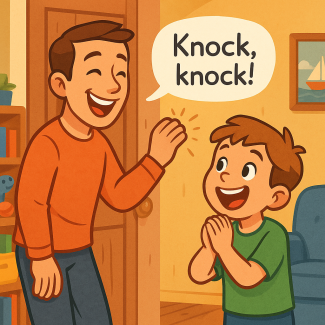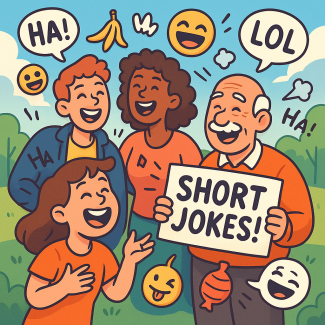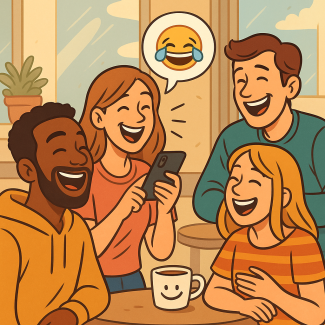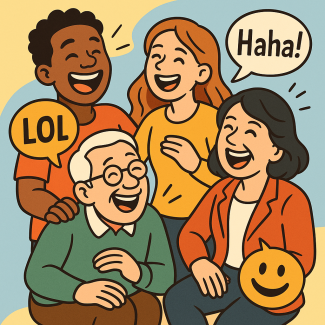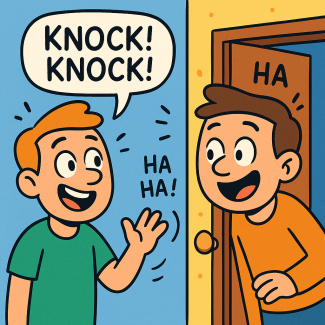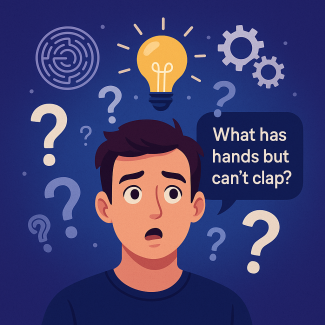
Brain-Teasing Riddles That Will Make You Think Twice
Discover the best short clever riddles for adults and kids who love to solve puzzles
There’s something undeniably thrilling about solving a clever riddle. That split-second moment when confusion flips into clarity is a small but powerful rush. And when riddles are short and clever, they pack that joy into just a few lines. Whether you're warming up your brain in the morning, livening up a family gathering, or challenging friends in a group chat, short clever riddles are a timeless, universally loved form of fun.
These brain teasers deliver more than entertainment—they exercise your mind, encourage creative thinking, and often reveal surprising insights into how we interpret the world around us. In this article, we’ll dive into the charm of short riddles with clever answers, explore what makes them so addictive, and show how they can spark joy in moments both big and small.
What makes a short riddle truly clever?
Not all riddles are created equal. The best ones blend wit, misdirection, and simplicity into a tiny puzzle that leaves you thinking, “Why didn’t I see that sooner?” A clever riddle doesn’t just stump you—it plays with logic, language, and expectation. It creates a little mystery, then turns the answer into an "aha!" moment.
Here’s what makes these brain games so irresistible:
- They’re easy to remember, making them perfect to share in conversation.
- They’re compact, so they don’t lose the audience’s attention.
- They twist logic, requiring lateral thinking rather than just knowledge.
- They often include puns, double meanings, or surprising turns of phrase.
That cleverness is what transforms a plain question into something unforgettable. The shorter the riddle, the more it relies on precision and creative thought. In other words, it’s a puzzle that works like poetry.
Why do people love short brain teasers so much?
There's a reason why short brain teasers for adults trend regularly on social media. In a fast-paced digital world, brevity matters. People want something engaging and clever they can read (and solve) in under a minute. These quick puzzles offer that little shot of satisfaction—a mini victory in your day.
But it’s more than convenience. The experience of solving a riddle triggers:
- Mental engagement – activating problem-solving areas of the brain.
- Emotional delight – that “aha!” burst of pride.
- Social interaction – riddles are meant to be shared, debated, and challenged.
In fact, riddles serve as a bridge between generations and cultures. Kids might giggle at a goofy question, while adults dig deeper into wordplay and ambiguity. It’s one of the few forms of entertainment that scale with age and intellect, which is part of their enduring charm.
Popular examples of short clever riddles that went viral
You’ve probably encountered a few clever riddles that exploded online. While we won’t list them all here, many people remember the viral favorites that circled group chats and comment threads. These often follow a familiar structure:
- A seemingly simple question
- A twist in expectation
- A one-line answer that makes you grin
This viral appeal is no accident. The best short riddles are snackable, satisfying, and social-media-ready. They’re the perfect content for scrolling users who want something quick and rewarding without the time investment of a game or long read.
How riddles boost your brain and improve thinking skills
It’s not just fun—short riddles with tricky answers also have cognitive benefits. Solving riddles activates both sides of the brain: the logical left hemisphere and the creative right. This means riddles can help improve:
- Critical thinking – assessing details and narrowing down possible meanings.
- Pattern recognition – spotting linguistic or logical similarities.
- Memory – recalling familiar riddles or applying similar structures.
- Lateral thinking – breaking away from standard problem-solving methods.
For children, riddles are an educational tool disguised as play. For adults, they’re a clever way to sharpen the mind and reduce mental fatigue. That makes riddles one of the rare forms of entertainment that’s both lighthearted and intellectually nourishing.
The emotional side of riddles: joy, laughter, and surprise
While brain-boosting is a great benefit, it’s the emotional experience that keeps people coming back. Riddles give us something few other things can: a moment of pure delight born from clarity. It’s like when a magician shows you the trick—your mind gets to marvel at how simple the answer was all along.
This emotional rollercoaster usually follows a pattern:
- Curiosity – You hear the question and your brain immediately wants to solve it.
- Frustration – The answer doesn’t come easily, and that builds tension.
- Revelation – You either guess it or hear the answer, and the pieces click into place.
- Satisfaction – That burst of recognition floods in, often followed by laughter.
It’s a brief but deeply satisfying emotional journey—one that’s short enough to fit between emails or over a coffee break, but strong enough to stick in your memory.
Why you’ll enjoy diving into these riddles
Reading riddles is more than a passing amusement—it’s a moment of curiosity reignited. You’re engaging with language, thought, and humor all at once. The beauty of clever short riddles lies in how much they can do with so little.
They add spark to slow days, boost group energy, and get everyone thinking in new directions. They’re fun alone, better in pairs, and unforgettable in a crowd. Whether you’re testing your wits, trying to impress your kids, or just want something a little different than scrolling through memes, riddles deliver.
And the best part? You never outgrow them. A good riddle is timeless.
Ready to stretch your brain and see things from a fresh perspective? Share your favorite riddle moments or challenge someone to crack a good one today.
25 short clever riddles with answers that will challenge your mind
Riddles are more than just wordplay—they’re miniature challenges that blend humor, logic, and unexpected insight. This curated list of short clever riddles with answers offers a quick mental workout while keeping things light, entertaining, and family-friendly. Perfect for group games, classroom warmups, or solo brain breaks, these riddles are short, sharp, and satisfying.
1. What comes once in a minute, twice in a moment, but never in a thousand years?
Answer: The letter M.
2. I’m tall when I’m young and short when I’m old. What am I?
Answer: A candle.
3. What has hands but can’t clap?
Answer: A clock.
4. The more of me you take, the more you leave behind. What am I?
Answer: Footsteps.
5. What can travel around the world while staying in the same corner?
Answer: A stamp.
6. What has one eye but can’t see?
Answer: A needle.
7. What has to be broken before you can use it?
Answer: An egg.
8. I’m not alive, but I can grow. I don’t have lungs, but I need air. What am I?
Answer: Fire.
9. What gets wetter the more it dries?
Answer: A towel.
10. What goes up but never comes down?
Answer: Your age.
11. What can you hold in your left hand but never in your right hand?
Answer: Your right hand.
12. The more you take away from me, the bigger I get. What am I?
Answer: A hole.
13. I speak without a mouth and hear without ears. I have nobody, but I come alive with wind. What am I?
Answer: An echo.
14. If two’s company and three’s a crowd, what are four and five?
Answer: Nine.
15. What begins with T, ends with T, and has T in it?
Answer: A teapot.
16. What is full of holes but still holds water?
Answer: A sponge.
17. What kind of coat is always wet when you put it on?
Answer: A coat of paint.
18. What invention lets you look right through a wall?
Answer: A window.
19. Forward I am heavy, but backward I am not. What am I?
Answer: The word "ton."
20. If you drop me, I’m sure to crack, but give me a smile and I’ll always smile back. What am I?
Answer: A mirror.
21. What can fill a room but takes up no space?
Answer: Light.
22. I have keys but no locks. I have space but no room. You can enter, but you can’t go outside. What am I?
Answer: A keyboard.
23. What has many teeth but can’t bite?
Answer: A comb.
24. The more you have of me, the less you see. What am I?
Answer: Darkness.
25. What runs but never walks, has a bed but never sleeps, and has a mouth but never speaks?
Answer: A river.
Fun riddles that are perfect for family game night
Short riddles make an excellent addition to any family game night. They’re quick, universally understandable, and encourage group participation. Instead of relying on lengthy trivia or complex board games, riddles can keep everyone engaged without the need for supplies or setup. They’re ideal for moments when you want spontaneous laughter, teamwork, and a touch of competition.
By mixing in clever riddles for all ages, you allow younger players to take part while still keeping the experience mentally stimulating for adults. It’s also a great way to introduce critical thinking skills for kids in a playful, pressure-free setting.
Use them between rounds of games, as icebreakers, or as the main attraction during a relaxed evening. And for those moments when someone solves the riddle before you even finish reading it—well, that just makes it all the more fun.
How to make riddle-solving a daily brain-boosting habit
Turning riddle-solving into a daily activity is easier than most people think. With just a few minutes a day, you can introduce a healthy dose of mental exercise into your routine. Short riddles are especially well-suited to morning routines, coffee breaks, and quick text exchanges with friends or coworkers.
Here’s how to integrate them:
- Add a new riddle to your whiteboard or fridge every morning.
- Start meetings or classes with a riddle warm-up.
- Include one in your child’s lunchbox as a daily surprise.
- Challenge friends through group chats or social apps.
- Share one with your partner at dinner to spark conversation.
This small habit builds better pattern recognition, improves memory retention, and boosts mood. And because riddles are so quick, they work even when you’re low on time or energy. Whether you’re looking to stay sharp or just need a bit of daily joy, short clever riddles for adults and kids are a simple yet powerful tool.
Why clever riddles are ideal for social media and content creators
The compact format of short clever riddles with answers makes them perfect for digital sharing. For content creators, influencers, and educators, they’re a fantastic way to drive engagement and interaction. A well-placed riddle can boost comment sections, encourage saves, and spark friendly debates.
Content strategies that benefit from riddles include:
- Instagram or TikTok story polls: Share a riddle, then reveal the answer the next day.
- Interactive YouTube shorts: Pose a riddle, pause for viewers to guess, then reveal.
- Twitter threads: Post one riddle a day to build engagement and anticipation.
- Newsletters and blogs: Break up long reads with quick brain teasers for entertainment.
In educational content, riddles can illustrate concepts in science, math, and language in an accessible way. They serve as brain teasers for critical thinking development and can bring even reluctant learners into the fold by making learning feel like play.
Why short clever riddles are here to stay
Riddles may be ancient, but their relevance has never faded. Their simplicity, surprise, and cleverness make them timeless. While trends come and go, the basic thrill of solving a mind-bending question in just a few lines continues to appeal across generations and cultures.
In our digital world, where attention is fleeting and entertainment is endless, riddles offer something rare: thoughtful pause. They encourage engagement without overwhelm. And they can deliver joy in just one sentence.
Whether you're collecting them for your classroom, saving a few for the next family trip, or using them to lighten up your team Slack channel, clever short riddles will always have a place in everyday fun.
Know someone who’d love a little brain teaser today? Send them one of your favorites and see how fast they crack it—or don’t.

